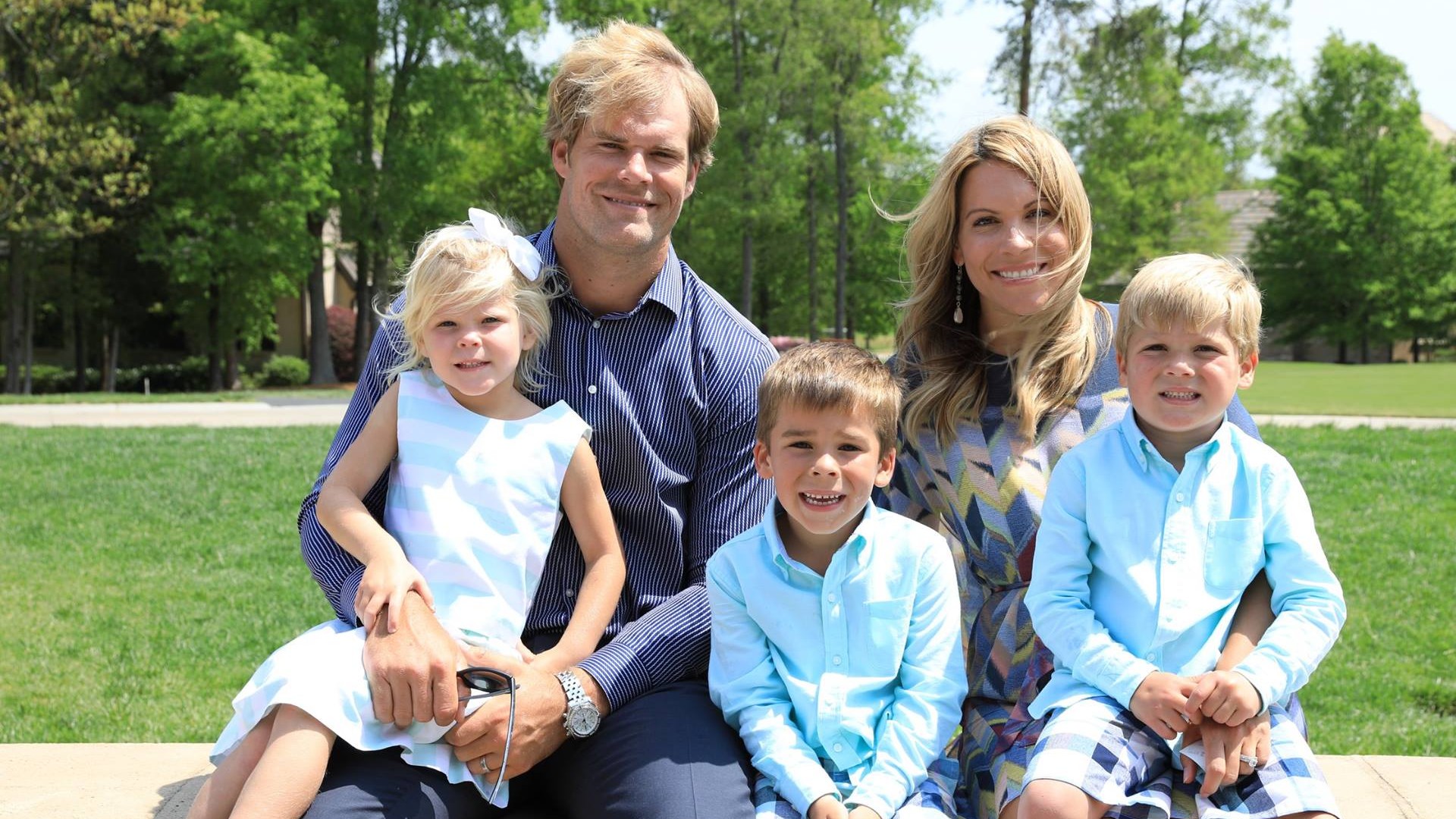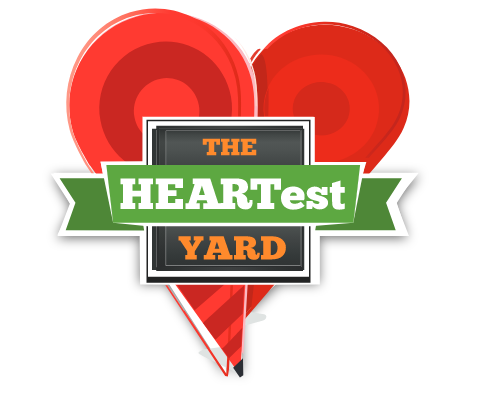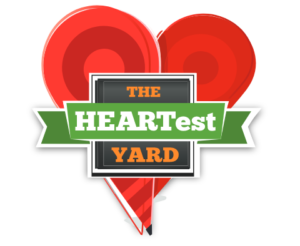Helping Little Hearts Grow Big: Kara and Greg Olsen’s Legacy of Love

n November 2017, The Greg Olsen Foundation: Receptions for Research, in partnership with Atrium Health Levine Children’s, announced the creation of a new cardiac neurodevelopmental program, supported by the foundation’s The HEARTest Yard fund. Since then, the program has evolved into a comprehensive clinic that cares for every aspect of a child – and their family – who has been affected by a heart condition.
Kara and Greg Olsen have a vision.
They see a group of 100 boys and girls of all backgrounds – playing together, learning together, reading and talking to each other. They see healthy, active and engaged kids who are living their best lives.
And in that crowd, indistinguishable from any of the others, is the one child with a chest full of scars. The one child, out of 100 born, who was born with a congenital heart disease. They see that child not just surviving, but excelling, thanks to the partnership between Atrium Health Levine Children’s and The HEARTest Yard fund – an initiative of The Greg Olsen Foundation.
Kara and Greg Olsen
The Vision
Kara and Greg’s own son T.J. was born with hypoplastic left heart syndrome, a congenital heart disease (CHD). The Olsens have dedicated much of their free time to helping families of children with CHDs. For these families, the Olsens are viewed as mentors, confidants and guides to navigating this new world.
Their passion to help other families who have been affected by CHD culminated in the creation of the The HEARTest Yard more than half a decade ago. Providing families with the necessary in-home clinical support during an infant’s earliest weeks and months – when they’re the most vulnerable – was their biggest focus for several years.
But as T.J. grew, so did his parents’ vision for what they could do to impact CHD patients and families, whose world is largely unseen for those not directly affected by it. The deeper they immersed themselves into the CHD world, the more they felt compelled to find solutions.
In November 2017, they made a financial investment to establish the next phase of The HEARTest Yard: the cardiac neurodevelopmental program with Levine Children’s. Since its creation, the program has provided comprehensive care for patients with congenital heart disease, and it’s the first-of-its-kind in the Southeast. In the future, this program will have a dedicated home within the Levine Children’s Hospital cardiology unit, providing new, innovative treatments using the latest technology.
“We started thinking about the legacy impact of what we wanted to do,” Greg says. “The HEARTest Yard has grown from an in-home service to an outpatient clinic that oversees the whole health of the patient. Our thinking has always been, ‘How can we take it to the next level; how we can we go beyond and reach more families?’”
“And we’re there not just for the well-being of a child – but of the entire family unit,” Kara adds. “We’re no longer just looking at how this affects the individual. Each family’s situation is unique. We have to look at what will assist the family as a whole.”
Since the announcement of the cardiac neurodevelopmental program, a lot of work has been happening behind the scenes to begin building this specialized service. And with the support of the Olsens and Levine Children’s leadership, a team of experts has begun to take shape.
The Team
Nancy Dobrolet, MD , knows all about the trials that patients and families with CHD face. As a pediatric cardiologist, she says that unfortunately the adult population of patients with CHD struggle with issues that were never properly addressed – things like anxiety, depression and learning disabilities.
“They’re alive, yes, but they could have used a lot of counseling and support,” Dr. Dobrolet says. “We just didn’t know about any of this at the time.”
But in the past decade, great strides have been made to recognize these issues. And in 2018, Dr. Dobrolet was invited to become the first director of the cardiac neurodevelopmental program at Levine Children’s – a decision supported by The HEARTest Yard. Dr. Dobrolet led a similar program at another hospital in Florida. Here in North Carolina, it’s her job to be able to recognize the difficult circumstances that patients with congenital heart disease and their families are in – and how best to go about addressing these needs.
“Not only are we paying attention to the heart defect, but we’re taking care of the whole family – socially, physically, emotionally, all of it,” Dr. Dobrolet says.
It starts by recognizing issues as soon as they’re discovered and having a plan to determine the optimal result for each patient. For pregnant women, it may mean new treatments that will help ease stress and anxiety and provide calm during the crucial prenatal weeks and months. After the baby is born, it may mean new therapies and methods of stimulation that can help prevent developmental delays. And when the child is older, it most likely means behavioral evaluations and special counseling sessions. When combined and adhered to properly, Dr. Dobrolet knows these therapies can make a difference in a child’s – and family’s – development.
“It’s within our power – both in the short-term and long-term – to bring awareness to these issues,” Dr. Dobrolet says. “And it’s my responsibility to educate my peers and the people I’m working with about this.”
Dr. Dobrolet oversees the cardiac neurodevelopmental clinic – a medical environment which enables patients to receive their evaluation, care and therapies all at once. Since taking the helm of the program, Dr. Dobrolet has added a dedicated nurse practitioner to her team, Kari Crawford, NP , as well as a dietitian, occupational therapists, speech therapists, and a group of other specialists that focus on the behavioral and psychological needs of each patient.
The team is also preparing to hire a neuropsychologist and a social worker and is looking to coordinate with other teams across Atrium Health on research projects.
The Inspiration
In 2012, the Olsens were ecstatic to find out Kara was pregnant with twins, nearly a year after the birth of their first child, Tate. But that excitement quickly turned to anxiety after they were told that one of their unborn twins, T.J., was diagnosed with hypoplastic left heart syndrome (HLHS). T.J. would need at least three complex heart operations to save his life before he was 2 years old. He would also need around-the-clock care for the first few months of his life, something they quickly realized after they first brought T.J. and his twin sister, Talbot, home from Levine Children’s Hospital. They were able to hire a live-in nurse who helped provide the appropriate care for T.J. during this critical period.
Greg and Kara Olsen’s Children — Tate, Talbot and T.J.
Through it all, T.J. showed a toughness and resilience beyond his years. He made it through all of his surgeries, which ended up being four in total – including one for a pacemaker. T.J. has been able to have as normal a life as the Olsens could only imagine when they first got the news of his diagnosis.
“I’ll take a call with a mom or dad of a child with congenital heart disease at least once a week, and we immediately connect,” Kara says. “There’s already a lot of emotions involved in a pregnancy, and when you add in CHD, it’s instantly traumatic. I’m able to help them understand the challenges of what that life is going to bring.”
It was at this time that the Olsens began the original mission of The HEARTest Yard: to provide the necessary resources to families of kids like T.J. who needed that extra clinical care and support during those early months. They began their outreach initiative – which includes several partnerships with area organizations, yearly fundraising events, speaking engagements and more. Greg was honored for this work by being named a two-time finalist for the NFL’s Walter Payton Man of the Year Award following the 2016 and 2017 seasons.
“We really enjoy it,” Kara says about the opportunities to share her family’s story. “I think a lot of the families I talk to can take inspiration from T.J.’s story. I think that’s one of our jobs – to provide hope to the families that are just coming into this – that there is hope down the road.”
The Future
So, what does the future look like for those with CHD? The advancements are already underway.
Thanks to advances in care, many more procedures that used to be done in an operating room can now be done less invasively in a cath lab – which means a faster recovery and less time in the hospital. Dr. Dobrolet says more attention is being paid to genetics and what ultimately causes heart defects.
Sometimes it feels like an uphill fight to continue banging the drum for CHD awareness, Dr. Dobrolet says. If you didn’t see the scars on their bodies, many times it would be hard to point among a group of children and determine which ones have undergone these incredible procedures.
Greg Olsen
But the good news is that the work is not stopping. Levine Children’s is a member institution of the Cardiac Neurodevelopmental Outcome Collaborative (CNOC) – “a multicenter, multinational, multidisciplinary group of healthcare professionals committed to working together and partnering with families to optimize neurodevelopmental outcomes for individuals with pediatric and congenital heart disease through clinical, quality, and research initiatives, intending to maximize quality of life across the lifespan.”
“This is something where we can take the good parts of different programs and share this information and really move the whole field forward together,” Dr. Dobrolet says.
And like the Olsens, Dr. Dobrolet wants her team’s work to have a lasting impact on the families they touch every day. “That’s what I hope to build here – because of the support of the Olsens and others. It’s been an amazing feeling.”




